BE动词的一般过去时
be动词的用法

be动词be动词,意思和用法很多,一般的意思是:是,此种用法,有多种变化形式,is,am,are,was,were,being,been,to be.另外,be动词还有成为的意思。
根据句子中不同的人称、数和时间,型态,应该选择相应的be动词。
要看语句的时态:如果是一般过去时,就用was/were如果是一般现在时,就用am/is/are如果是一般将来时,就用will be然后看主语的人称及复数形式:一般过去时:第一人称和第三人称的单数形式,则用was第一人称和第二人称、第三人称的复数,则用were一般现在时:第一人称单数形式,用am第三人称单数形式,用is第一人称复数、第二人称、第三人称的复数形式,则用are一般将来时:will be口诀:一般时态有关be动词的口诀:我用am,你用are,is连着他她它,单数主语用is,复数主语全用are。
用法he is, we are, you are, they are (缩略式I'm, you're, he's, we're, you're, they're), (否定缩略式I'm not, isn't, aren't), 过去时I was, you were, he was, we were, you were, they were (过去时否定缩略式wasn't, weren't),过去分词been,现在分词being英语的"be"是个特殊动词;有些语言,如马来文等,并没有"be"这样的动词。
"Be"除了原形的"be"之外,还有另外七种形式:am, is, are, been, being, was, were. 在句子中,"be"可以是主动词(The Principal Verb)或助动词(The Auxiliary Verb)例句【陈述句】The man is a science teacher.这个男子是一位科学教师。
be动词的一般过去式
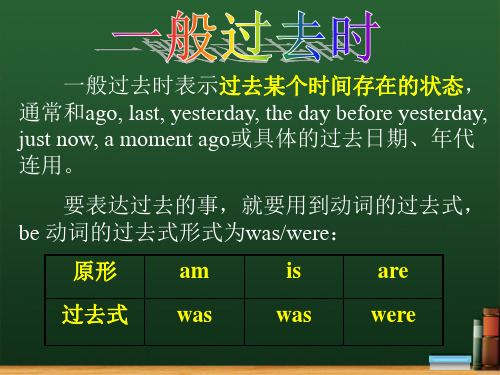
be 动词一般过去时否定句: 主语+be动词(was/were)+not+其他 I was not at home last night.
我昨天晚上不在家。
He was not tall when he was young.
他小时候长的不高。
We were not in Shanghai last year.
过去式
am
was
is
was
are
were
be 动词一般过去时肯定句:
主语+be动词(was/were)+其他
She was very busy yesterday.她昨天很忙。 She was very sad last week.她上周很伤心。 He was at school lat Tuesday.他上周二在学校。 They were my friends.他们以前和我是朋友。
一般过去时表示过去某个时间存在的状态, 通常和ago, last, yesterday, the day before yesterday, just now, a moment ago或具体的过去日期、年代 连用。
要表达过去的事,就要用到动词的过去式, be 动词的过去式形式为was/were: 原形
我们去年不在上海。
be 动词一般过去时一般疑问句: be动词(was/were)+ 主语+其他 Was he in the zoo? 他在动物园吗? Were you in the playground just now?
你们刚刚在操场吗?
Were they at home last night?
他们昨天晚上在家吗?
be 动词一般过去时特殊疑问句:
be动词的一般过去时
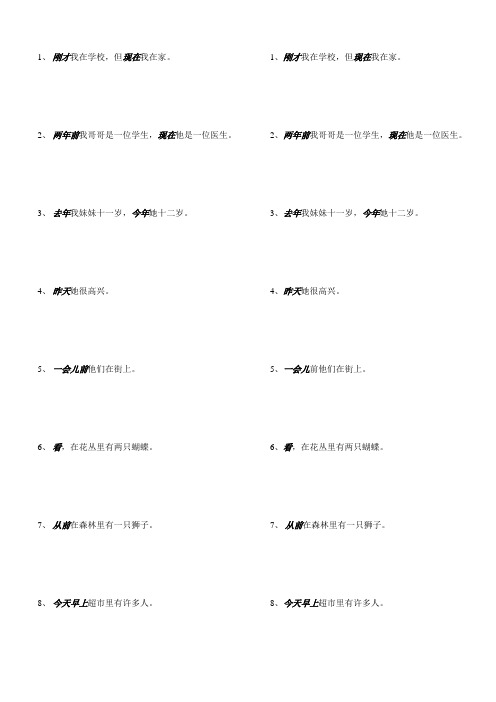
1、刚才我在学校,但现在我在家。
2、两年前我哥哥是一位学生,现在他是一位医生。
3、去年我妹妹十一岁,今年她十二岁。
4、昨天她很高兴。
5、一会儿前他们在街上。
6、看,在花丛里有两只蝴蝶。
7、从前在森林里有一只狮子。
8、今天早上超市里有许多人。
1、刚才我在学校,但现在我在家。
2、两年前我哥哥是一位学生,现在他是一位医生。
3、去年我妹妹十一岁,今年她十二岁。
4、昨天她很高兴。
5、一会儿前他们在街上。
6、看,在花丛里有两只蝴蝶。
7、从前在森林里有一只狮子。
8、今天早上超市里有许多人。
一般过去时的句子结构

一般过去时的句子结构1、be动词的一般过去时其句型:肯定式:主语+BE动词过去式(was、were)+其他 e.g.I was very happy last night.否定式:主语+BE动词过去式(was、were)+not+其他 e.g.Mike wasn’t at home yesterday. 疑问式:BE动词过去式(was、were)+主语+其他 e.g.Was he a driver three years ago?2、当谓语由实义动词充当(不区分第三人称单数):肯定式:主语+动词过去式+其它 e.g.I played the piano yesterday evening.否定式为:主语+did not+动词原形+其它 e.g.He didn’t go to the cinema last night.疑问式为:Did+主语+动词原形+其它 e.g.Did she teach you English yesterday?一般过去时的句子结构1、be动词的一般过去时其句型:肯定式:主语+BE动词过去式(was、were)+其他 e.g.I was very happy last night.否定式:主语+BE动词过去式(was、were)+not+其他 e.g.Mike wasn’t at home yesterday. 疑问式:BE动词过去式(was、were)+主语+其他 e.g.Was he a driver three years ago?2、当谓语由实义动词充当(不区分第三人称单数):肯定式:主语+动词过去式+其它 e.g.I played the piano yesterday evening.否定式为:主语+did not+动词原形+其它 e.g.He didn’t go to the cinema last night.疑问式为:Did+主语+动词原形+其它 e.g.Did she teach you English yesterday?一般过去时的句子结构1、be动词的一般过去时其句型:肯定式:主语+BE动词过去式(was、were)+其他 e.g.I was very happy last night.否定式:主语+BE动词过去式(was、were)+not+其他 e.g.Mike wasn’t at home yesterday. 疑问式:BE动词过去式(was、were)+主语+其他 e.g.Was he a driver three years ago?2、当谓语由实义动词充当(不区分第三人称单数):肯定式:主语+动词过去式+其它 e.g.I played the piano yesterday evening.否定式为:主语+did not+动词原形+其它 e.g.He didn’t go to the cinema last night.疑问式为:Did+主语+动词原形+其它 e.g.Did she teach you English yesterday?。
be动词的一般过去式

be 动词一般过去时特殊疑问句: 特殊疑问词+be 动词+主语+其他
Where were you yesterday? 你昨天晚上去哪了?
What was there in the cup then? 那时,杯子里有什么?
be 动词一般过去时一般疑问句: be动词(was/were)+ 主语+其他
Was he in the zoo? 他在动物园吗?
Were you in the playground just now? 你们刚刚在操场吗?
Were they at home last night? 他们昨天晚上在家吗?
be 动词一般过去时否定句: 主语+be动词(was/were)+not+其他
I was not at home last night. 我昨天晚上不在家。
He was not tall when he was young. 他小时候长的不高。
We were not in Shanghai last year. 我去式 was
was
were
be 动词一般过去时肯定句: 主语+be动词(was/were)+其他
She was very busy yesterday.她昨天很忙。 She was very sad last week.她上周很伤心。 He was at school lat Tuesday.他上周二在学校。 They were my friends.他们以前和我是朋友。
一般过去时表示过去某个时间存在的状态,
通常和ago, last, yesterday, the day before yesterday, just now, a moment ago或具体的过去日期、年代 连用。
(精品)BE动词的一般过去时

A. Was; before
B. Is; before
C. Was; after
D. Is; after
( )5. —Who was on duty last Friday﹖
—___B___.
A. I am
B. I was
C. Yes, I was
D. No, I wasn't
一、用be动词的适当形式填空 1. I ___w_as___ at school yesterday. 2. He ___w_a_s___ at the camp last week. 3. We ___w_e_re___ students two years ago. 4. They ___w_e_re___ on the farm a moment ago. 5. Yang Ling ___w_as____ eleven years old last year. 6. There ___w_a_s___ an apple on the plate yesterday. 7. There ___w__as___ some milk in the fridge on Sunday. 8. The mobile phone ___w_a_s__ on the sofa yesterday evening.
2. All the students were very excited. 否定句: _A_l_l t_h_e_s_tu_d_e_nt_s_w_e_re_n_o_t_v_er_y_e_xc_i_te_d_. ______________________ 一般疑问句: _W__er_e_a_ll_th_e_s_t_ud_e_n_ts_v_e_ry_e_x_c_it_ed_?_____________________ 肯、否定回答: _Y_e_s_, t_h_e_y _w_er_e_. ___________N_o,_t_he_y_w_e_r_e_n_ot_. _________
be动词的时态变化
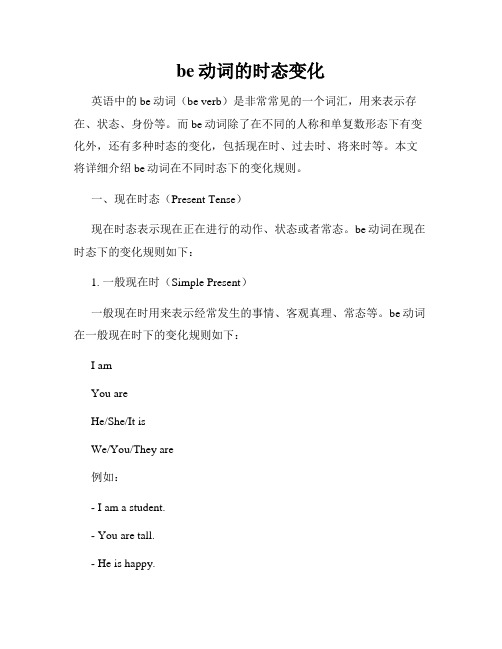
be动词的时态变化英语中的be动词(be verb)是非常常见的一个词汇,用来表示存在、状态、身份等。
而be动词除了在不同的人称和单复数形态下有变化外,还有多种时态的变化,包括现在时、过去时、将来时等。
本文将详细介绍be动词在不同时态下的变化规则。
一、现在时态(Present Tense)现在时态表示现在正在进行的动作、状态或者常态。
be动词在现在时态下的变化规则如下:1. 一般现在时(Simple Present)一般现在时用来表示经常发生的事情、客观真理、常态等。
be动词在一般现在时下的变化规则如下:I amYou areHe/She/It isWe/You/They are例如:- I am a student.- You are tall.- He is happy.2. 现在进行时(Present Continuous)现在进行时用来表示现在正在进行的动作。
be动词在现在进行时下的变化规则如下:I am beingYou are beingHe/She/It is beingWe/You/They are being例如:- I am studying.- You are watching TV.- He is writing a letter.3. 现在完成时(Present Perfect)现在完成时用来表示过去发生的动作对现在的影响。
be动词在现在完成时下的变化规则如下:I have beenYou have beenHe/She/It has beenWe/You/They have been例如:- I have been to France.- You have been busy.- He has been sick.二、过去时态(Past Tense)过去时态表示过去发生的动作或者存在的状态。
be动词在过去时态下的变化规则如下:1. 一般过去时(Simple Past)一般过去时用来表示过去发生的动作或存在的状态。
be动词的用法规则

be动词的用法规则一、be动词的基本用法二、be动词在不同时态中的用法2.1 be动词在一般现在时中的用法2.2 be动词在一般过去时中的用法2.3 be动词在一般将来时中的用法三、be动词在不同人称和数上的变化形式四、be动词在其他语境中的常见用法一、be动词的基本用法Be动词是英语中最基础、最常用的助动词之一,表示“是”或“存在”的概念。
它包括am, is, are, was, were等形式,具体选择哪个形式取决于句子主语和所使用的时态。
例如:- I am a student.- He is from Canada.- They were classmates.二、be动词在不同时态中的用法2.1 be动词在一般现在时中的用法:- 在一般现在时肯定句中,第一人称单数使用am,第三人称单数使用is,复数使用are。
例如:I am a teacher. / She is a doctor. / They are students.- 在一般现在时否定句和疑问句中,在am, is后面加not;are后面加not或直接将are提到主语前。
例如:He is not here. / Are you a student? / Is she coming?2.2 be动词在一般过去时中的用法:- 在一般过去时肯定句中,不论人称和数,都使用was来代表单数主语,使用were来代表复数主语。
例如:I was at home. / They were classmates.- 在一般过去时否定句和疑问句中,在was, were后面加not;疑问句将was, were提到主语前。
例如:She was not there. / Were they friends? / Was he talking to you?2.3 be动词在一般将来时中的用法:- 在一般将来时肯定句中,be动词与will连用,形式为will be。
be动词在一般过去时中是如何变化的

【导语】以下是整理的《be动词在⼀般过去时中是如何变化的》,⼀起来看看吧!1.主语是第⼀⼈称单数“I”(我),⼀般过去时中的be动词变为“was”2.主语是第⼆⼈称单数“you”(你),⼀般过去时中的be动词变为“were”3.主语是第三⼈称单数“he/she/it”(他/她/它),⼀般过去时中的be动词变为“was”4.主语是第⼀⼈称复数“we”(我们),⼀般过去时中的be动词变为“were”5.主语是第⼆⼈称复数“you”(你们),⼀般过去时中的be动词变为“were”6.主语是第三⼈称复数“they”(他们/她们/它们),⼀般过去时中的be动词变为“were”咱⼀看上⾯的规则也许有些复杂,但仔细观察后想必⼤家发现了⼀些规律?对,除了第⼀和第三⼈称单数使⽤was外,其余⼀律⽤were。
(←这条捷径很重要的)下⾯来验证下这条捷径是否正确:1.I was in the classroom yesterday morning.昨天早上我在教室⾥。
2.You were a student a year ago.⼀年前我们还是学⽣。
3.The teacher was very beautiful ten years ago.10年前那位⽼师⾮常漂亮。
好了,通过以上的⼏个例句验证,⼤家是否了解了be动词在⼀般过去时中的变化呢?那么,接下来我们做⼏道题测试下你掌握得如何?!将下列句⼦改成否定句;They ———at school last Tuesday.A.wereB.areC.isD.do答案:A好了,以上就是关于be动词在⼀般过去时中的变化的介绍。
希望⼤家在⽇常的学习中勤加练习,最后,祝⼤家英语考试取得理想的成绩。
一般过去时详解(重点)

一般过去时详解(重点)一般过去时是表示过去发生的事情,因此常用的时间状语有yesterday。
last night。
last week。
last year等。
在句子中,肯定句要用动词的过去式,否定句和疑问句则要使用助动词did和didn’t。
一、一般过去时的概念:一般过去时用于描述过去某一时间内发生的动作或存在的状态,以及过去惯性、反复性的动作。
常与表示过去的时间状语连用,如yesterday、last night、last week、last year等。
二、一般过去时的结构:(可分三类不同的结构)1.Be动词的一般过去时在没有实义动词的句子中使用be动词,am和is的过去式为was,而are的过去式为were。
在句子中,肯定句式为主语+be(was。
were)+其它,否定句式为主语+be(was。
were)+not+其它,一般疑问句式为Be(was。
were)+主语+其它。
需要注意的是,be动词有人称和数的变化,即要根据主语选用was/were。
2.实义动词的一般过去时态在实义动词的肯定句中,要使用动词的过去式;而在否定句和疑问句中,则要使用助动词do和does的过去式did。
具体来说,肯定句式为主语+动词(过去式)+其它,否定句式为主语+didn’t+动词(原形)+其它(did not=didn’t),一般疑问句式为Did+主语+动词(原形)+其它(do、does的过去时均为did)。
需要注意的是,did和didn’t是构成一般过去时的助动词,其后要跟动词的原形。
3.情态动词的一般过去时态含有情态动词的一般过去时与含有Be动词的一般过去时十分相似。
在句子中,肯定句式为主语+情态动词+其它,否定句式为主语+情态动词+not+其它,一般疑问句式为情态动词+主语+其它。
需要注意的是,情态动词的过去式有一定的规律:can→could,may→might,must→must,will→would,should→should。
【语法讲解】be动词的一般过去时的用法

be动词的一般过去时的用法be 动词的一般过去时表示过去某个时间存在的状态,通常和ago, last, yesterday, the day before yesterday, just now, a moment ago或者具体的过去的日期、年代连用。
⑴一般过去时中主语是第一人称或者第三人称单数、名词的单数形式时,谓语动词用was。
当主语是第二人称或者复数形式时,谓语动词用were。
I was at home last night.The man was born in America.The woman was a teacher four years ago.My father was at the office just now.Yesterday it was rainy.The day before yesterday the girl was ill.Last spring the boy was in Canada.In 1990 the girl was ten years old.The boys were in the classroom a moment ago.They were on the playground two hours ago.We were in the park yesterday morning.⑵ be 动词的一般过去时的各种句式肯定句:The old man was at home last night.The students were in the classroom two hours ago.否定句:The old man was not (wasn’t) at home last night.The students were not (weren’t ) in the classroom two hours ago.一般疑问句:Was the old man at home last night?Yes, he was. / No, he wasn’t.Were the students in the classroom two hours ago?Yes, they were. / No, they weren’t.特殊疑问句:Where was the old man last night?When was the old man at home?Who was at home last night?Where were the students two hours ago?When were the students in the classroom? Who were in the classroom two hours ago?。
be动词的一般过去式
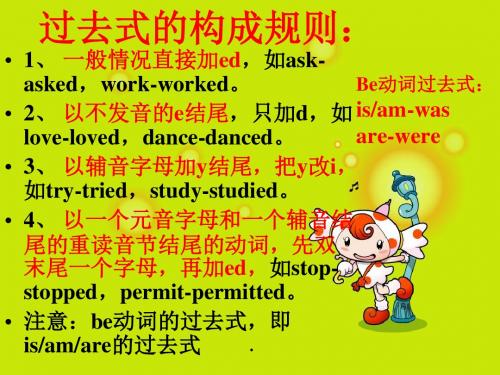
选择填空。
(
C )1. My father______ill yesterday.
A. isn't C. wasn't B. aren't D. weren't
(
week﹖ A. Is C. Are
D )2. ______your parents at home last
B. Was D. Were
•
(
B
)3. The twins______in Dalian last year. They __here now. A. are; were B. were; are
C. was; are D. were; was ( )4. ______your father at work the day_____ yesterday﹖
B
A. Was; before
(
B. Is; before
B
C. Was; after D. Is; after )5. —Who was on duty last Friday﹖ —______. A. I am C. Yes, I was B. I was
D.•No, I wasn't
一般过去时的肯定句、否定句和 疑问句中的be动词变化如下:
1.肯定句 结构:主语+was/were+其他 2.否定句 结构:主语+was/were+not+其他 3.一般疑问句及其回答 结构:Was/Were+主语+其他? 4.特殊疑问句及其回答 结构:特殊疑问词+was/were+主语+其他?
•
过去式的构成规则:
• 1、 一般情况直接加ed,如askBe动词过去式: asked,work-worked。 • 2、 以不发音的e结尾,只加d,如 is/am-was are-were love-loved,dance-danced。 • 3、 以辅音字母加y结尾,把y改i, 如try-tried,study-studied。 • 4、 以一个元音字母和一个辅音结 尾的重读音节结尾的动词,先双 末尾一个字母,再加ed,如stopstopped,permit-permitted。 • 注意:be动词的过去式,即 is/am/are的过去式 •
一般过去时

一般过去时
目录
CONTENTS
一般过去时的种类 be动词的一般过去时 行为动词的一般过去时 一般过去时的用法
动词的一般现在时种类
(一)be动词的一般过去时 (二)行为动词的一般过去时
(一)be动词的一般过去时 动词可以分为: 系动词:不能单独做谓语,与其他词合成构成谓语。 助动词 行为动词 情态动词
人称
一般过去时行为动词一般疑问句形式
所有人称
Did+主语+行为动词原形+…?
Did+主语+行为动词原形+…?
(四)行为动词一般过去时的特殊疑问句
人称
一般现在时行为动词特殊疑问句形式
特殊疑问句回答
所有人称 特殊疑问词+did+主语+行为动词原形+…? 不能用yes/no回答,而且 回答时动词要变成过去式。
You were at school.
Were you at school?
They were tired last night. Were they tired last night?
Yes, I was. No, I wasn't.
Yes, he was. No, he wasn't. Yes, we were. No, we weren't. Yes, they were. No, they weren't.
人称
所有人称
一般过去时行为动词否定形式
did not +行为动词原形 did+not=didn’t
(三)行为动词一般过去时的一般疑问句
Did he go there? Did you telephone your uncle yesterday? Did they do their homework?
be动词的一般过去时及练习题

be动词的一般过去时及练习题Be动词是英语中最基础的动词之一,它用于表达人或事物的状态、举止、性质等。
而在过去时态中,be动词的形式发生了变化,让我们一起来学习一下be动词的一般过去时,以及一些相关的练习题。
一、Be动词的一般过去时形式在一般现在时态中,be动词的形式有三种:am(用于第一人称单数),is(用于第三人称单数)和are(用于第二人称、第一人称复数和第三人称复数)。
而在一般过去时态中,be动词的形式发生了变化,具体如下:1. 第一人称单数:I was2. 第三人称单数:He/She/It was3. 第二人称单数和复数:You were4. 第一人称复数和第三人称复数:We/They were二、使用be动词的一般过去时1. 描述过去的状态或性质例句:- She was tired after a long day at work.- They were happy to see each other again.2. 表示过去的行为或位置- I was playing basketball with my friends yesterday.- The cat was sitting on the chair all day.3. 表达过去的偏好或观点例句:- He was always a fan of rock music.- We were against the idea from the beginning.三、练习题现在,让我们进行一些练习题来巩固一下所学的知识。
请根据句子的意思,用be动词的一般过去时填空。
1. The students ________ excited about the upcoming field trip.2. Last night, it ________ raining heavily.3. My parents ________ worried when they couldn't reach me.4. We ________ at the movies when she called.5. ________ you at home when he arrived?6. She ________ a great actress in her prime.7. They ________ not ready for the presentation yesterday.8. It ________ a beautiful day at the beach.参考答案:2. was3. were4. were5. Were6. was7. were8. was四、总结通过学习本文,我们了解了be动词的一般过去时的形式和用法。
be动词的一般过去时
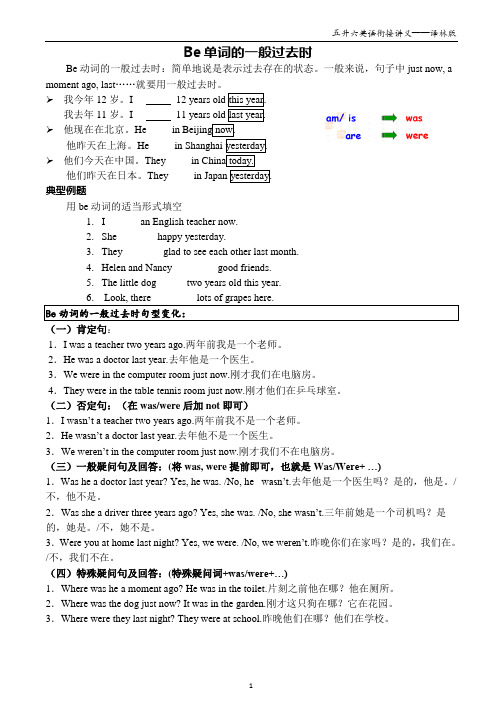
Be单词的一般过去时Be动词的一般过去时:简单地说是表示过去存在的状态。
一般来说,句子中just now, a moment ago, last……就要用一般过去时。
我今年12岁。
I ___我去年11岁。
I ___他现在在北京。
他昨天在上海。
他们今天在中国。
他们昨天在日本。
典型例题用be动词的适当形式填空1. I ______ an English teacher now.2. She _______ happy yesterday.3. They _______ glad to see each other last month.4. Helen and Nancy ________ good friends.5. The little dog _____ two years old this year.(一)肯定句:1.I was a teacher two years ago.两年前我是一个老师。
2.He was a doctor last year.去年他是一个医生。
3.We were in the computer room just now.刚才我们在电脑房。
4.They were in the table tennis room just now.刚才他们在乒乓球室。
(二)否定句:(在was/were后加not即可)1.I wasn’t a teacher two years ago.两年前我不是一个老师。
2.He wasn’t a doctor last year.去年他不是一个医生。
3.We weren’t in the computer room just now.刚才我们不在电脑房。
(三)一般疑问句及回答:(将was, were提前即可,也就是Wa s/Were+ …)1.Was he a doctor last year? Yes, he was. /No, he wasn’t.去年他是一个医生吗?是的,他是。
Be动词过去式

Be动词过去式同学们,最近我们学习了Be动词的一般过去式,你们掌握得如何?下面有一口诀,它可以帮你们更好地掌握Be动词的一般过去式。
Be的过去式有四巧:一是时间状语巧,表示过去的短语要记牢;二是形式巧,单数was,复数were;否定句结构是三巧,not紧跟was/were;四是疑问句式巧,was/were向前跑(提前)。
同学们,你们知道它讲的是什么意思吗?让我来给你们解释一下吧。
【一巧】时间状语巧。
一般过去时表示过去发生的动作或存在的状态,恰巧与表示过去的一些时间状语连用。
例如:yesterday,lastnight/week/month/year,lastSaturday,thedaybeforeyesterday,in1998,fiveyearsago等。
【二巧】形式巧。
它与一般现在时(am,is,are)一样,形式多样。
当主语是第一人称单数或第三人称单数时,谓语动词用was;主语是第二人称或其他人称复数时,谓语动词用were。
例如:Iwasintheclassroomyesterdaymorning.昨天早上我在教室里。
HewasatschoollastTuesday.上周二他在学校。
Theywereoverthereamomentago.刚才他们在那边。
【三巧】否定句结构巧。
与一般现在时一样,它在动词后面加not即可变成否定句,并且was,were与not可以缩写成wasn’t,weren’t。
即:主语+wasn’t/weren’t+表语+其他。
例如:Iwasnot(=wasn’t)hereyesterday.昨天我不在这儿。
Myparentswerenot(=weren’t)athomelastSunday.上周日我父母不在家。
【四巧】疑问句式巧。
把was,were提到句首,句末用问号即可变为一般疑问句。
即:Was/Were+主语+表语+其他?这与Be动词的一般现在时的疑问句式相似。
例如:Wereyouathomethedaybeforeyesterday?前天你在家吗?Wasshelatethismorning?今天早上她迟到了吗?更巧的是疑问句的答语也相似,肯定回答用“Yes,主语+was/were.”;否定回答用“No,主语+wasn’t/weren’t.”。
- 1、下载文档前请自行甄别文档内容的完整性,平台不提供额外的编辑、内容补充、找答案等附加服务。
- 2、"仅部分预览"的文档,不可在线预览部分如存在完整性等问题,可反馈申请退款(可完整预览的文档不适用该条件!)。
- 3、如文档侵犯您的权益,请联系客服反馈,我们会尽快为您处理(人工客服工作时间:9:00-18:30)。
划线提问
• 1.The sofa was under the window. • Where was the sofa?
C ( )1. My father______ ill yesterday. A. isn't B. aren't C. wasn't D. weren't
D ( )2. ______ your parents at home last week﹖ A. Is B. Was C. Are D. Were
小结
be动词的一般过去时的用法
am , is ——过去式 was 否定式 was not / wasn’t are 过去式 were 否定式 were not /weren’t
be动词的一般过去时的结构
1. 肯定句:主语+谓语动词的过去式+其他 2. 否定句:主语+was/were+ not+其他
B ( )3. The twins______ in Dalian last year. They______here now. A. are; were C. was; are B. were; are D. were; was
A ( )4. ______ your father at work the day_____yesterday﹖
1.肯定句 主语+be动词过去式+其他
I am __ ____
busy (一般现在时) _____
(一般过去时)
I was busy
例句
• She was there.她过去在那里。 • We were there.我们曾在那里。 • You were a worker.你曾经是个工人。
2.否定句 主语+was/were+ not+其他
二、 句型转换 1. It was exciting. 否定句: It was not exciting. ________________________________________________ 一般疑问句: ____________________________________________ Was it exciting? 肯、否定回答: Yes, it was. No, it was not. __________________________________________
3. 肯定句:Was/Were+主语+其他?
改为否定句
• 1.He was ten years old last year. • He wasn’t ten years old last year. • 2. There were many students in the school. • There weren’t many students in the school. • 3.She was very short. • She wasn’t very short.
Were ythere?她过去在那里吗? • Were they there?他们过去在那里吗?
例题:
1. 2. 3. 4. 5. 6. 7. 8. were in Beijing in 1960. They ______ was ill yesterday. I _____ was at home yesterday evening. My sister____ were you born? Where ______ were naughty. They ______ was angry. She ______ was Dorothy_____born in England. Was she a teacher? ______
2. All the students were very excited. 否定句: All the students were not very excited. ________________________________________________ 一般疑问句: Were all the students very excited? ____________________________________________ 肯、否定回答: Yes, they were. No, they were not. __________________________________________
A. Was; before C. Was; after B. Is; before D. Is; after
( )5. —Who was on duty last Friday﹖ B —______.
A. I am
C. Yes, I was
B. I was
D. No, I wasn't
一、用be动词的适当形式填空 was 1. I _______ at school yesterday.
Thank you!
BE 动词的一般过去时
其实Be动词的一般过去时 的用法很容易理解,只要 把be动词换成过去形式就 可以组成一个句子了,这 是最简单的造一个一般过 去时的句子的方法。
be动词的一般过去时
原形 am 过去时 was
is
was
are
were
be动词的一般过去时的结构 be动词的一般过去时的例题
小结be动词的一般过去时
I am not busy. __ _________ _____ (一般现在时)
I wasn’t busy.(一般过去时)
例句
• He wasn’t a farmer. 他曾不是一个农民。 • We weren’t there.我们曾经不在那里。
3.一般疑问句 Was/Were+主语+其他?
Are busy? ____ you __ ________
改为一般疑问句 • 1. I was very tired yesterday. • Were you very tired yesterday? • 2.They were black and white. • Were they black and white? • 3.The picture was beside the lamp. • Was the picture beside the lamp?
